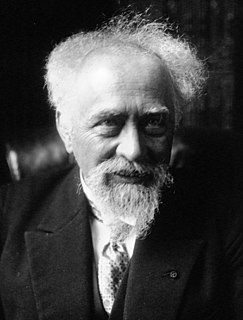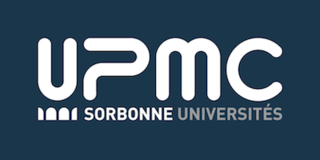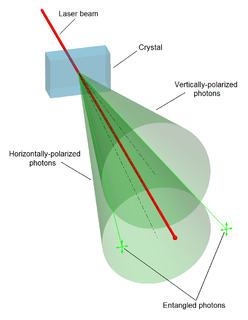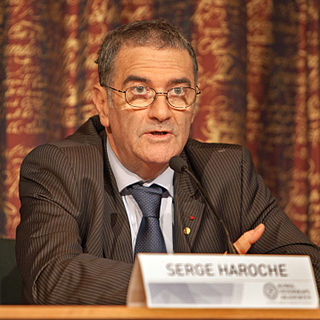
The École normale supérieure is one of the French grandes écoles and a school of PSL University since 2010.
ESPCI Paris is an institution of higher education founded in 1882 by the city of Paris, France. It educates undergraduate and graduate students in physics, chemistry and biology and conducts high-level research in those fields. It is ranked as the first French École d'Ingénieurs in the 2017 Shanghai Ranking.

Jean Baptiste Perrin was a French physicist who, in his studies of the Brownian motion of minute particles suspended in liquids, verified Albert Einstein’s explanation of this phenomenon and thereby confirmed the atomic nature of matter. For this achievement he was honoured with the Nobel Prize for Physics in 1926.

Alain Aspect is a French physicist noted for his experimental work on quantum entanglement.
The Institut d'astrophysique de Paris is a research institute in Paris, France. The Institute is part of the Université Pierre et Marie Curie and is associated with the CNRS Centre national de la recherche scientifique. It is located at 98bis, Boulevard Arago Il in the 14th arrondissement of Paris, adjacent to the Paris Observatory.

Pierre and Marie Curie University, titled as UPMC from 2007–2017 and also known as Paris 6, was a public research university in Paris, France from 1971 to 2017. The university is located on the Jussieu Campus in the Latin Quarter of the 5th arrondissement of Paris, France.
Jean-Philippe Bouchaud is a French physicist. He is founder and Chairman of Capital Fund Management (CFM), professor of physics at École polytechnique and co-director of the CFM-Imperial Institute of Quantitative Finance at Imperial College London. He is a member of the French Academy of Sciences.
Jean Dalibard is a French physicist, Professor at the École Polytechnique, member of the French Academy of Sciences and a researcher at the École Normale Supérieure. In 2009, Dalibard received the Blaise Pascal medal of the European Academy of Sciences for "his outstanding and influential works in atomic physics and quantum optics". In 2012, he received the Max Born Award and Davisson–Germer Prize.

L’École de Physique des Houches was founded in 1951 by a young French scientist, Cécile DeWitt-Morette.
Pierre Aigrain was a French physicist and Secretary of Research in the French Academy of Sciences.
Jean-Michel Raimond is a French physicist working in the field of quantum mechanics.
Claude Fabre is a French physicist, professor at the École polytechnique and member of the Kastler-Brossel Laboratory at École normale supérieure.
The Three Physicists Prize is a physics prize awarded by the École Normale Supérieure (ENS) in Paris and the Eugène Bloch Foundation. It is named in honour of the physicists Henri Abraham, Eugene Bloch and Georges Bruhat, who were successive directors of the physics laboratory at the ENS and all of whom died in Nazi concentration camps between 1943 and 1945. The prize was established by Bloch's widow.
Kastler is a surname. Notable people with the surname include:










